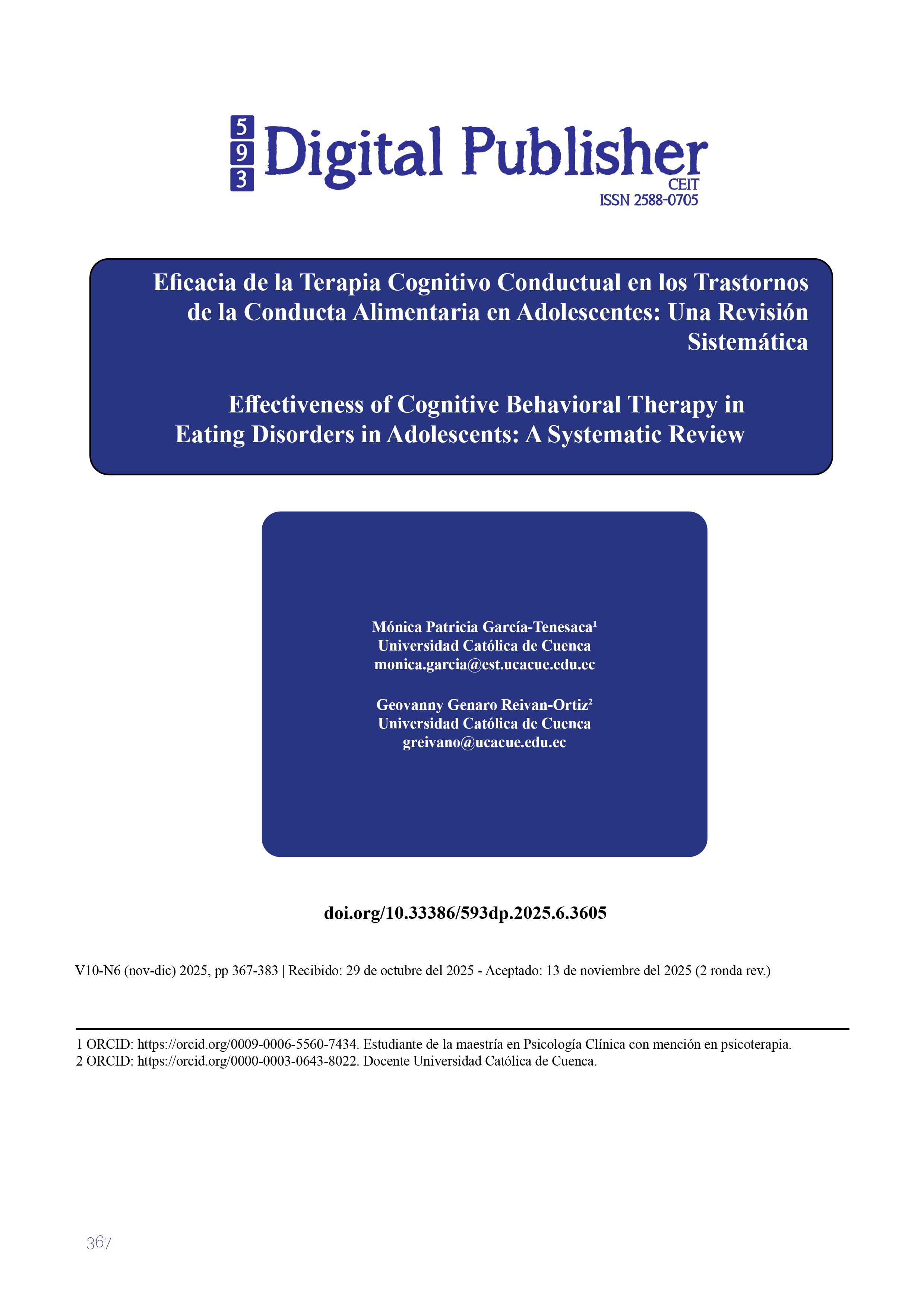Eficacia de la Terapia Cognitivo Conductual en los Trastornos de la Conducta Alimentaria en Adolescentes: Una Revisión Sistemática
Contenido principal del artículo
Resumen
Los trastornos de la Conducta Alimentaria (TCA) son considerados enfermedades psicológicas graves multifactoriales, que impactan mayormente a la población adolescente y se caracterizan por la alteración en la ingesta de alimentos, así como en pensamientos irracionesles asociadas al peso, figura y comida, dando como resultado comportamientos desadaptativos. Dado el impacto que tienen en la salud física y mental de los adolescentes es crucial evaluar la eficacia de la Terapia Cognitivo Conductual (TCC) en los Trastornos de la Conducta Alimentaria en adolescentes como plan de intervención. Por consiguiente, esta investigación está consolidada por Ensayos Clínicos Aleatorizados publicados desde 2015 hasta 2025 registrados en bases de datos científicas como: Scopus, Pu bmed y ScienceDirect, usando Rayyan para la clasificación de estudios, PRISMA 2020 para la selección y CONSORT 2010 y AMSTAR 2 para la evaluación de la calidad metodológica de los artículos seleccionados. Al final fueron 6 los estudios que cumplieron con los criterios de inclusión. Los hallazgos de esta revisión sistemática evidencian la eficacia de la TCC en la reducción de síntomas propios de los TCA como episodios de atracones, conductas purgativas, preocupación por la comida, el peso, la figura y baja autoestima, al igual que trastornos comórbidos, tales como depresión, ansiedad. Cabe mencionar que las intervenciones que involucran a la familia obtienen mejores resultados en la remisión de síntomas propios de los TCA.
Descargas
Detalles del artículo

Esta obra está bajo una licencia internacional Creative Commons Atribución-NoComercial-CompartirIgual 4.0.
1. Derechos de autor
Las obras que se publican en 593 Digital Publisher CEIT están sujetas a los siguientes términos:
1.1. 593 Digital Publisher CEIT, conserva los derechos patrimoniales (copyright) de las obras publicadas, favorece y permite la reutilización de las mismas bajo la licencia Licencia Creative Commons 4.0 de Reconocimiento-NoComercial-CompartirIgual 4.0, por lo cual se pueden copiar, usar, difundir, transmitir y exponer públicamente, siempre que:
1.1.a. Se cite la autoría y fuente original de su publicación (revista, editorial, URL).
1.1.b. No se usen para fines comerciales u onerosos.
1.1.c. Se mencione la existencia y especificaciones de esta licencia de uso.
Citas
Arija Val, V., Santi Cano, M. J., Novalbos Ruiz, J. P., Canals, J., & Rodríguez Martín, A. (2022). Characterization, epidemiology and trends of eating disorders. Nutrición Hospitalaria. https://doi.org/10.20960/nh.04173
Ayrolles, A., Clarke, J., Godart, N., André-Carletti, C., Barbe, C., Bargiacchi, A., Blanchet, C., Bergametti, F., Bertrand, V., Caldagues, E., Caquard, M., Castellotti, D., Delorme, R., Dreno, L., Landou, D. F., Gerardin, P., Guessoum, S., Gicquel, L., Léger, J., … Stordeur, C. (2024). Early-onset anorexia nervosa: a scoping review and management guidelines. Journal of Eating Disorders, 12(1), 182. https://doi.org/10.1186/s40337-024-01130-9
Baile, J. I., & Rabito-Alcón, M. F. (2022). Cognitive Behavioural Therapy for an Adolescent with Anorexia Nervosa. Children, 9(1), 92. https://doi.org/10.3390/children9010092
Bermúdez Durán, L. V., Chacón Segura, M. A., & Rojas Sancho, D. M. (2021). Actualización en trastornos de conducta alimentaria: anorexia y bulimia nerviosa. Revista Médica Sinergia, 6(8), e753. https://doi.org/10.31434/rms.v6i8.753
Biney, H., Giles, E., Hutt, M., Matthews, R., & Lacey, J. H. (2022). Self-esteem as a catalyst for change in adolescent inpatients with anorexia nervosa: a pilot randomised controlled trial. Eating and Weight Disorders - Studies on Anorexia, Bulimia and Obesity, 27(1), 189–198. https://doi.org/10.1007/s40519-021-01161-0
Bohon, C. (2019). Binge Eating Disorder in Children and Adolescents. Child and Adolescent Psychiatric Clinics of North America, 28(4), 549–555. https://doi.org/10.1016/j.chc.2019.05.003
Chahuan, J., Rey, P., & Monrroy, H. (2021). Síndrome de rumiación. Artículo de revisión. Revista de Gastroenterología de México, 86(2), 163–171. https://doi.org/10.1016/j.rgmx.2020.11.001
D’Adamo, L., Laboe, A., Goldberg, J., Howe, C., Fennig, M., DePietro, B., Firebaugh, M.-L., Cooper, Z., Wilfley, D., & Fitzsimmons-Craft, E. (2024). Development and usability testing of an online platform for provider training and implementation of cognitive-behavioral therapy guided self-help for eating disorders. https://doi.org/10.21203/rs.3.rs-4409969/v1
Escandón Nagel, N., & Garrido-Rubilar, G. (2021). Trastorno por Atracón: una mirada integral a los factores psicosociales implicados en su desarrollo. Nutrición Clínica y Dietética Hospitalaria, 40(4). https://doi.org/10.12873/404escandon
Fonseca, N. K. O., Curtarelli, V. D., Bertoletti, J., Azevedo, K., Cardinal, T. M., Moreira, J. D., & Antunes, L. C. (2024). Avoidant restrictive food intake disorder: recent advances in neurobiology and treatment. Journal of Eating Disorders, 12(1), 74. https://doi.org/10.1186/s40337-024-01021-z
Gaete, M. V., López, C., & Matamala, M. (2012). Trastornos de la conducta alimentaria en adolescentes y jóvenes. Revista Médica Clínica Las Condes, 23(5), 579–591. https://doi.org/10.1016/S0716-8640(12)70352-8
González Tuta, D. F., Barreto Porez, A. P., & Salamanca Camargo, Y. (2017). Terapia Cognitiva: Antecedentes, teoría y metodología [Investigación documental]. Revista Iberoamericana de Psicología, 10(2), 99–107. https://doi.org/10.33881/2027-1786.rip.10211
Hartmann, A. S., Poulain, T., Vogel, M., Hiemisch, A., Kiess, W., & Hilbert, A. (2018). Prevalence of pica and rumination behaviors in German children aged 7–14 and their associations with feeding, eating, and general psychopathology: a population-based study. European Child & Adolescent Psychiatry, 27(11), 1499–1508. https://doi.org/10.1007/s00787-018-1153-9
Hilbert, A., Petroff, D., Neuhaus, P., & Schmidt, R. (2020). Cognitive-Behavioral Therapy for Adolescents with an Age-Adapted Diagnosis of Binge-Eating Disorder: A Randomized Clinical Trial. Psychotherapy and Psychosomatics, 89(1), 51–53. https://doi.org/10.1159/000503116
Keegan, E., Waller, G., Tchanturia, K., & Wade, T. D. (2024). The potential value of brief waitlist interventions in enhancing treatment retention and outcomes: a randomised controlled trial. Cognitive Behaviour Therapy, 53(6), 608–620. https://doi.org/10.1080/16506073.2024.2351867
Le Grange, D., Lock, J., Agras, W. S., Bryson, S. W., & Jo, B. (2015). Randomized Clinical Trial of Family-Based Treatment and Cognitive-Behavioral Therapy for Adolescent Bulimia Nervosa. Journal of the American Academy of Child & Adolescent Psychiatry, 54(11), 886-894.e2. https://doi.org/10.1016/j.jaac.2015.08.008
Lin, B. Y., Moog, D., Xie, H., Sun, C.-F., Deng, W. Y., McDaid, E., Liebesny, K. V, Kablinger, A. S., & Xu, K. Y. (2024). Increasing prevalence of eating disorders in female adolescents compared with children and young adults: an analysis of real-time administrative data. General Psychiatry, 37(4), e101584. https://doi.org/10.1136/gpsych-2024-101584
Love, M., & Baudinet, J. (2025). Treatment outcomes for adolescent bulimia nervosa: a systematic scoping review of quantitative findings. Journal of Eating Disorders, 13(1), 68. https://doi.org/10.1186/s40337-025-01236-8
Medina-Tepal, K. A., Vázquez-Arévalo, R., López-Aguilar, X., & Mancilla-Díaz, J. M. (2021). Conductas asociadas a los trastornos de pica, rumiación y evitación/restricción de alimentos en adolescentes. Psicología y Salud, 31(2), 203–214. https://doi.org/10.25009/pys.v31i2.2689
Murphy, R., Straebler, S., Cooper, Z., & Fairburn, C. G. (2010). Cognitive Behavioral Therapy for Eating Disorders. Psychiatric Clinics of North America, 33(3), 611–627. https://doi.org/10.1016/j.psc.2010.04.004
Murray, H. B., Juarascio, A. S., Di Lorenzo, C., Drossman, D. A., & Thomas, J. J. (2019). Diagnosis and Treatment of Rumination Syndrome: A Critical Review. American Journal of Gastroenterology, 114(4), 562–578. https://doi.org/10.14309/ajg.0000000000000060
Nyman-Carlsson, E., Norring, C., Engström, I., Gustafsson, S. A., Lindberg, K., Paulson-Karlsson, G., & Nevonen, L. (2020). Individual cognitive behavioral therapy and combined family/individual therapy for young adults with Anorexia nervosa: A randomized controlled trial. Psychotherapy Research, 30(8), 1011–1025. https://doi.org/10.1080/10503307.2019.1686190
Ouzzani, M., Hammady, H., Fedorowicz, Z., & Elmagarmid, A. (2016). Rayyan—a web and mobile app for systematic reviews. Systematic Reviews, 5(1), 210. https://doi.org/10.1186/s13643-016-0384-4
Page, M. J., McKenzie, J. E., Bossuyt, P. M., Boutron, I., Hoffmann, T. C., Mulrow, C. D., Shamseer, L., Tetzlaff, J. M., Akl, E. A., Brennan, S. E., Chou, R., Glanville, J., Grimshaw, J. M., Hróbjartsson, A., Lalu, M. M., Li, T., Loder, E. W., Mayo-Wilson, E., McDonald, S., … Moher, D. (2021). The PRISMA 2020 statement: An updated guideline for reporting systematic reviews. PLOS Medicine, 18(3), e1003583. https://doi.org/10.1371/journal.pmed.1003583
Rodríguez-Riesco, L., Vivas, S., Mateos Herrera, A., Pérez-Calvo, C., & Ruiz-Duet, A. (2022). Behavior therapy: roots, evolution and reflection on the relevance of behaviorism in the clinical context. Papeles Del Psicólogo - Psychologist Papers, 43(3), 209. https://doi.org/10.23923/pap.psicol.2994
Schulz, K. F., Altman, D. G., & Moher, D. (2010). CONSORT 2010 Statement: updated guidelines for reporting parallel group randomised trials. BMJ, 340(mar23 1), c332–c332. https://doi.org/10.1136/bmj.c332
Terreros, P. (2023). Técnicas cognitivo conductuales en el tratamiento de la Bulimia Nerviosa, mini-review. Revista Medica HJCA, 15(2), 74–79. https://doi.org/10.14410/2023.15.2.rb.12
Thomas, J. J., Wons, O. B., & Eddy, K. T. (2018). Cognitive–behavioral treatment of avoidant/restrictive food intake disorder. Current Opinion in Psychiatry, 31(6), 425–430. https://doi.org/10.1097/YCO.0000000000000454
Tinahones, F. J., & Gonzalo-Marín, M. (2004). Abordaje de los trastornos de la conducta alimentaria. Endocrinología y Nutrición, 51(4), 225–229. https://doi.org/10.1016/S1575-0922(04)74609-4
Valenzuela, F., Lock, J., Le Grange, D., & Bohon, C. (2018). Comorbid depressive symptoms and self‐esteem improve after either cognitive‐behavioural therapy or family‐based treatment for adolescent bulimia nervosa. European Eating Disorders Review, 26(3), 253–258. https://doi.org/10.1002/erv.2582
Vogel, E. N., Singh, S., & Accurso, E. C. (2021). A systematic review of cognitive behavior therapy and dialectical behavior therapy for adolescent eating disorders. Journal of Eating Disorders, 9(1), 131. https://doi.org/10.1186/s40337-021-00461-1
Wilson, G. T., Wilfley, D. E., Agras, W. S., & Bryson, S. W. (2010). Psychological Treatments of Binge Eating Disorder. Archives of General Psychiatry, 67(1), 94. https://doi.org/10.1001/archgenpsychiatry.2009.170
Young, S. L. (2010). Pica in Pregnancy: New Ideas About an Old Condition. Annual Review of Nutrition, 30(1), 403–422. https://doi.org/10.1146/annurev.nutr.012809.104713



